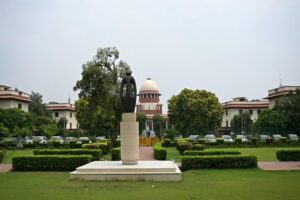SYLLABUS
GS-2: Structure, organisation and functioning of the Executive and the Judiciary; Statutory, regulatory and various quasi-judicial bodies.
Context:
Recently, the Supreme Court Constitution Bench ruled that judicial officers with seven years of prior advocacy experience are eligible for appointment as District Judges under Article 233 of the Constitution.
Key highlights of the Supreme Court Ruling
- The five-judge Constitution Bench headed by Chief Justice of India B.R. Gavai held that judicial officers who had completed seven years of practice at the Bar before joining service would now qualify for appointment as District Judges.
- The Bench clarified that Article 233(2) of the Constitution, which prescribes qualifications for advocates, does not exclude judicial officers who had prior Bar experience.
- The Court observed that the interpretation of Article 233 must be contextual and not merely textual, emphasising that restrictive readings limiting competition cannot be accepted.
- The judgment overruled earlier interpretations from Rameshwar Dayal v. State of Punjab (1960) and Chandra Mohan v. State of Uttar Pradesh (1966), which had excluded in-service officers with prior Bar experience.
- The Bench stated that such exclusion deprived capable judicial officers of opportunities, thereby undermining judicial dynamism and efficiency.
- The Court directed that the ruling will apply prospectively, safeguarding past recruitment processes except where interim orders exist.
- It instructed State governments, in consultation with High Courts, to amend recruitment rules within three months to align with this decision.
- The Court also clarified that the right to practice as an advocate is only suspended when one joins the judicial service and that the name remains on the Bar roll.
- The Bench further mandated that candidates must possess a minimum of seven years of combined experience as an advocate and judicial officer and must be at least 35 years old on the date of application.
Constitutional provision for the appointment of District Judges
The appointment, posting and promotion of district judges in a state are made by the Governor of the state in consultation with the High court.
A person to be appointed as a district judge should have the following qualifications:
- He should not already be in the service of the Central or the state government.
- He should have been an advocate or a pleader for seven years.
- He should be recommended by the high court for appointment.
Appointment of persons (other than district judges) to the judicial service of a state is made by the governor of the state after consultation with the State Public Service Commission and the high court.
Significance of the Judgment
- This ruling expands the pool of eligible candidates for District Judge posts, addressing stagnation in promotions within the judiciary.
- It promotes a merit-based judicial system by recognising the value of prior advocacy experience.
- The decision reinforces federal cooperation between States and High Courts in framing uniform recruitment rules.


